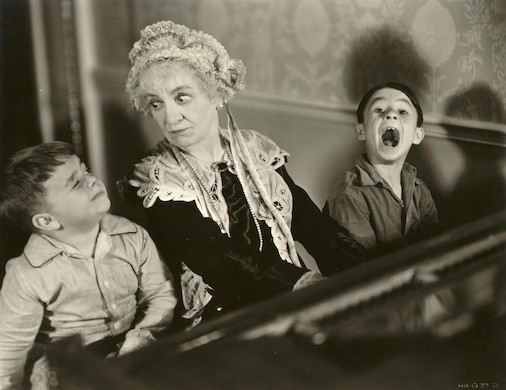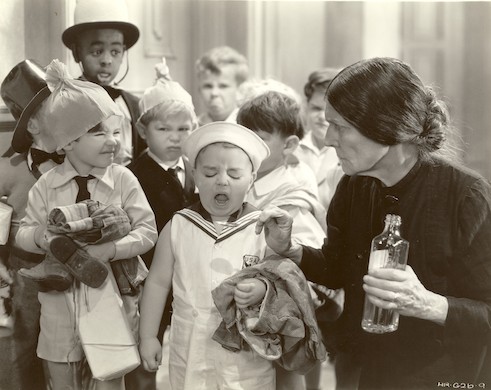Kids Being Kids: ‘Our Gang’ Proves To Be Timeless
What makes the new ‘Little Rascals’ collection essential is a bonus disc containing four hours of extra features.

‘The Little Rascals: The Complete Collection Centennial Edition’ (ClassicFlix)
We are on a Hollywood movie set in the mid-1920s. The scene calls for a young actress, Mary Kornman, to pick up a glass of milk and drink. Instead, she accidentally knocks it over and milk spills on another child. Were it any other film shoot, the director would immediately yell, “Cut,” and then they’d retake the scene, sticking to the script. Instead, producer Hal Roach and director Robert McGowan were canny enough to let the cameras keep rolling, to let the cast improvise what happens next, and to encourage them to act and react like regular children.
That’s the magic of the “Our Gang” series (also known as “The Little Rascals”): kids being kids. More specifically, they’re real-life kids who exist in a fantasy world all their own, a world created by adults to reflect a childlike point of view.

The co-author with Leonard Maltin of the definitive history of the series, “The Little Rascals: The Life and Times of Our Gang,” Richard Bann, tells that story, recounted to him by Roach, in one of the bonus features of a newly released DVD package, “The Little Rascals: The Complete Collection Centennial Edition.” The set contains six bluRay discs and gathers what most believe are the peak of “Our Gang,” the shorts produced by Roach between the first talking episode, in 1929, and 1938, when the producer sold the rights to MGM and left the series.
The talkie shorts have already been released on individual discs, but what makes the new package essential is a bonus disc containing four hours of extra features. Some of these are new, making-of type mini-documentaries, including a fascinating look at the Los Angeles and Hollywood locations where many of the original shorts were filmed, and juxtaposing images of those streets and buildings then and now.
There’s also a particularly revealing featurette about the music in the films, explaining the roles of the two primary musical directors, Leroy Shields and Marvin Hatley, and delineating certain specific cues that appear and reappear on the soundtracks — cues that those of us who grew up with the Little Rascals on television (which might be everybody born until about 1980) know by heart.
Other highlights are a smattering of foreign-language editions of the shorts — apparently all that survive — including a complete Spanish version of “When The Wind Blows.” Even if you don’t habla español, it’s incredibly funny, almost more so than the familiar English-language edition. The character of Jackie Cooper’s father is replaced by Spanish actor Julian Rivero, but Edgar Kennedy is still in his place as a blustering and blundering cop.
The greatest offering in the new material is a sampling that points to both the past and the future. There are three shorts from the mid-1920s, and now ClassicFlix is promising that they’re going to keep going by restoring as many of the silent “Our Gang” films as possible. Based on the three included here, that will be a package worth waiting for.

“The Big Show” (1923) has the kids constructing an amazingly elaborate version of a circus and sideshow, with local animals tricked up to resemble exotic beasts (no giraffes were harmed in the making of this film). “Dogs of War” (also 1923) — and this isn’t the last time “Our Gang” would quote from Shakespeare’s “Julius Caesar” — begins with the gang re-enacting World War 1 in a way that Quentin Tarantino should take note of: in trenches, with kid-style machine guns, grenades, and even a tank, plus no shortage of overripe produce. Both of these entries conclude with highly elaborate parodies of silent cinema, the latter featuring a cameo by the jazz age comic legend Harold Lloyd.
“Mary, Queen of Tots” (1925) — extra points for that brilliant title, by the way — is the most imaginative; there’s a sequence where dolls come to life that not only foreshadows dozens of 1930s Hollywood cartoons but directly anticipates the entire “Toy Story” franchise.
Much like the music of Duke Ellington, the classic Roach-produced “Our Gang” episodes are a perfect balance of predetermined outlines and on-the-spot improvisation. By the time MGM began producing the shorts in 1938 — at which point they would continue for another six years and 52 episodes — the cast seemed more like highly polished child performers, a little too polished in some cases, and less like real kids being themselves. While everything is still in its place, it just isn’t the same old gang.

